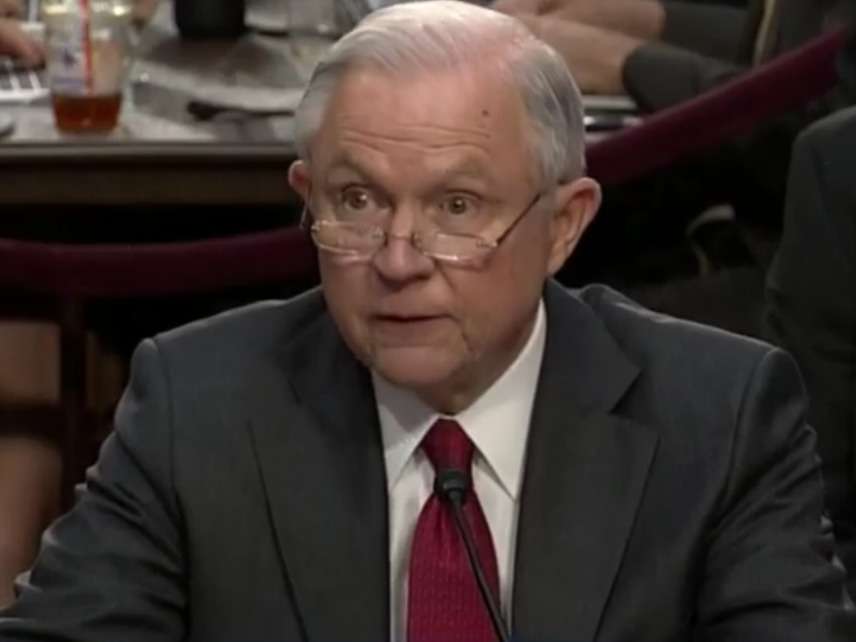Jeff Sessions Wants More Mandatory Minimums, Less Justice
The attorney general is determined to reverse the recent trend toward more judicious use of severe penalties.

A new report from the U.S. Sentencing Commission (USSC) suggests that charging policies recently rescinded by Attorney General Jeff Sessions resulted in more judicious application of mandatory minimums penalties, shortening prison terms for a substantial number of federal drug offenders. If federal prosecutors follow Sessions' lead, that welcome trend will be reversed, meaning that people who do not belong behind bars (because their only crime is violating the government's arbitrary pharmacological taboos) will spend more time there.
Mandatory minimums have a dramatic impact on the amount of time prisoners serve. "In fiscal year 2016," the USSC notes, "the average sentence length for offenders who were convicted of an offense carrying a mandatory minimum penalty was 110 months [more than nine years] of imprisonment, nearly four times the average sentence (28 months) for offenders not convicted of an offense carrying a mandatory minimum penalty." Because mandatory minimums eliminate judicial discretion, it is prosecutors who decide whether these harsh penalties will be imposed by deciding what charges to bring.
Attorney General Eric Holder issued two memos aimed at encouraging federal prosecutors to put more thought into that process. In 2010 he reminded prosecutors that while they "should ordinarily charge" the most serious provable offense, that decision should not be automatic; rather, it should be based on "an individualized assessment of the extent to which particular charges fit the specific circumstances of the case, are consistent with the purpose of the Federal criminal code, and maximize the impact of Federal resources on crime." Three years later, Holder went further, telling prosecutors they should omit drug weight, which is what triggers mandatory minimums, from charges against nonviolent drug offenders without leadership roles, significant criminal histories, or significant ties to large-scale drug trafficking organizations.
Judging from evidence presented in the USSC report, these instructions had a noticeable impact on charging decisions. Between fiscal years 2010 and 2016, the share of federal defendants convicted of crimes carrying mandatory minimums fell by nearly a fifth, from 27 percent to 22 percent. "In both 2010 and 2013," the commission notes, "the Department of Justice instructed prosecutors to be more selective in charging offenses with a mandatory minimum penalty, specifically regarding certain nonviolent, low-level drug offenders. Thus, it is not surprising to see a reduction in the frequency with which offenders were charged with such offenses."
Consistent with that change, the share of mandatory-minimum defendants who received sentencing relief due to "substantial assistance" or the statutory "safety valve" for low-level, nonviolent drug offenders fell from 47 percent in FY 2010 to 39 percent in FY 2016. That is what you would expect to see if prosecutors became less likely to bring mandatory-minimum charges against low-level, nonviolent drug offenders. Having caught a break at the charging stage, these less serious offenders would not need relief from mandatory minimums at the sentencing stage.
The USSC also considered factors related to violence, which would disqualify defendants from the prosecutorial forbearance urged by Holder. As indicators of violence, the commission looked for sentencing enhancements for use of a weapon, violence, or threats of violence; base offense levels linked to death or serious bodily injury; and convictions for a firearm offenses carrying mandatory minimums. In FY 2016, one or more of these sentencing factors applied in 29 percent of drug trafficking cases with mandatory minimums, up from 21 percent in FY 2010.
The commission also notes that "offenders convicted of a drug trafficking offense carrying a mandatory minimum penalty were more likely to have received an adjustment for aggravating role" in FY 2016 than in FY 2010 and "more likely to have received three criminal history points or more." Those factors, like violence, run afoul of the criteria listed in the 2013 memo.
These trends suggest that prosecutors became more discriminating in bringing mandatory-minimum charges after Holder issued his memos, which is consistent with the results of a recent survey of assistant U.S. attorneys conducted by the Justice Department's inspector general. Nearly half (49 percent) of the respondents said they had changed their charging practices in response to Holder's directives. Another 20 percent said it was already their practice to avoid triggering mandatory minimums for low-level, nonviolent drug offenders.
Sessions, who argues that low-level, nonviolent offenders are essentially nonexistent in the federal system, wants prosecutors to be less discriminating. While he allows for the possibility of lenience in extraordinary cases, such decisions would have to be justified in writing and approved by supervisors. Sessions is trying to establish a strong presumption in favor of bringing the most serious provable charge, leaving little room for "individualized assessment."
After growing steadily for more than three decades, the federal prison population has been shrinking since 2014. The change in the DOJ's charging practices is just one of several factors behind that trend, which also include the lighter crack penalties enacted by Congress in 2010 and the USSC's subsequent changes to federal sentencing guidelines. But as the commission notes, the effects of Holder's policies will continue to be felt for years as drug offenders who avoided mandatory minimums during the Obama administration are released earlier than they otherwise would have been. The same, of course, is true of the harsher approach that Sessions favors: Long after the Trump administration has ended, Americans whose crimes violated no one's rights will remain in cages from which they otherwise would have been freed.


Show Comments (44)